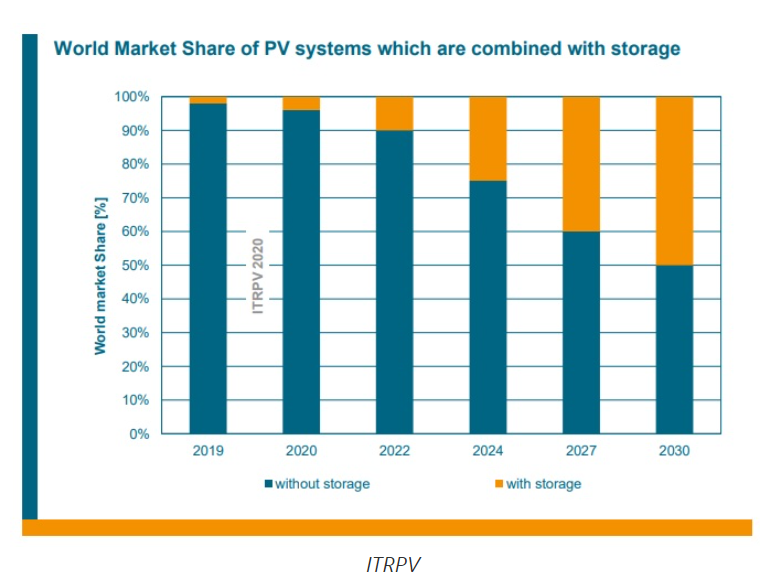
Privacy statement: Your privacy is very important to Us. Our company promises not to disclose your personal information to any external company with out your explicit permission.
With the advancement of solar energy, Battery Energy Storage System is playing its role in the power supply because of their ability to convert the solar energy into stable power output. Solar plus Battery Storage is a wonderful technology. According to the ITRPV`s report, it showed that 4% of global solar PV projects in 2020 came paired with batteries, and the group expects 50% of projects will be solar + storage by 2030. In the past, lead-acid batteries domain the main market for Energy Storage . However, lithium iron phosphate battery technology is embraced as a new alternative for storing energy. Are Lithium Iron Phosphate Battery better than Lead Acid Battery? Let`s make a comparison below.

· High safety vs Leakage and explosion risk
Lithium Iron Phosphate Battery is one of the favorable batteries for energy storage systems due to its feature of stability. With a three-dimensional network olivine structure, it can maintain a relatively stable structure even at high temperatures. It easily passes all the safety tests such as needle stick test, overcharge test, etc. The LiFePO4 Battery is safe and stable even when the battery is damaged, causing no explosion or other safety failure. However, traditional lead acid batteries may have battery leakage risk after a long time of use. It can ruin whatever device it has leaked into. It requires regular maintenance to ensure the battery in a good state. Furthermore, if the battery is used incorrectly, it may cause an explosion.
· Long cycle life vs Short cycle life
For energy storage systems, a long lifespan is an important factor to consider. The cycle life decides how long the battery can be used before it died. The cycle life of a LiFePO4 battery is about 5 times longer than a lead-acid battery. Usually, the lead-acid battery can last for 300-500 cycles while the LiFePO4 battery has a longer cycle life of more than 2500 cycles. Therefore, the replacement cost will be higher if employ lead-acid batteries for the energy storage systems. Although the initial investment of the Lithium iron phosphate battery is high, it can bring a considerable return.
· High energy density vs Low energy density
A better energy density is a remarkable characteristic of Lithium Iron Phosphate Battery. It has a higher energy density than lead-acid battery, which means that more energy is available for a lithium-ion battery when compared to a lead-acid battery at the same volume. This makes the LiFePO4 battery can be in compact size and lightweight. It is 1/3 weight and a half volume of a lead-acid battery. Sometimes, energy storage systems are installed in limited space, and the LiFePO4 battery with small size and lightweight make limited space installation possible.
· Deep Depth of Discharge vs Low Depth of Discharge
The discharge capability of Lead-acid batteries is lower than Lithium Iron Phosphate Batteries. If the lead-acid batteries discharge too much energy, it will damage their capability to store energy. Generally, the lead-acid battery can be discharged to 50% and need to be recharged. It has around 1500 cycles at 50%DOD. However, the lithium iron phosphate battery has a higher DOD. If the LiFePO4 battery is discharged to 50%, it can last for about 5000 cycles which we can see a significant increase in energy storage capacity.
·Eco-friendly vs Environmental Pollution
Lithium iron phosphate battery contains no toxic battery material, which can supply the power you need without polluting the environment. It can be a green battery to help you reduce the carbon footprint on the environment. While for the lead acid battery, sulfuric acid and lead are two key components to build lead acid battery, so using lead acid battery for energy storage will result in environmental pollution such as the contamination of solid and groundwater. It goes against the purpose of [solar energy storage".
In 2020, COVID-19 influences peoples` life greatly. House is the place where people stay for the longest time because it is where they work or play. At this hard time, natural disasters such as hurricanes in Mexico, wildfires, or long-time power blackout in Texas further hit peoples` life. Many homeowners come to realize the importance of a backup power plan to keep an uninterrupted house. Manufacturer UFO POWER has committed to harnessing the combined technologies-- [solar+battery storage" to provide power solutions in the residential market.
Not only does the UFO LiFePO4 Battery energy storage system supply reliable power when the lights go out, but it helps reduce your reliance on the local grid. Besides, it is a good money-saving system when the grid rates go up. Solar plus battery storage improves resilience! And LiFePO4 Batteries can be an ideal alternative to lead-acid batteries. As battery technology continues to develop, more solar installation with lithium ion battery storage will be seen.

Privacy statement: Your privacy is very important to Us. Our company promises not to disclose your personal information to any external company with out your explicit permission.

Fill in more information so that we can get in touch with you faster
Privacy statement: Your privacy is very important to Us. Our company promises not to disclose your personal information to any external company with out your explicit permission.